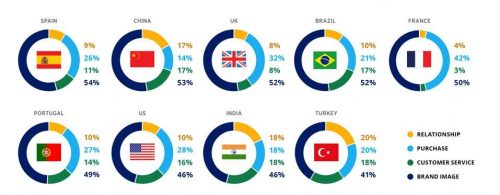
In March last year, I wrote about Havas CX’s X Index and how it offered a new and holistic view of a brand’s customer experience (CX). The most exciting thing about their research was that their analysis found some common predictors of what constitutes a good experience for customers. Their research also highlighted the simple but often overlooked idea that preferences, particularly those around customer experience, are not homogeneous and differ from country to country.
This year Havas CX have expanded their coverage to nine countries: China, France, India, the United Kingdom, the United States, Brazil, Turkey, Portugal and Spain. To conduct their research, they surveyed 50,000 adults from across the world about more than 500 brands from various industries.
In doing so, they analyzed more than 35 different variables and identified 13 that were significant predictors of CX satisfaction. These variables were spread across five categories: brand image, purchase, product and service experience, relationship and customer service.
The good news is that for most countries the 2021 X Index scores were higher than they were in 2020, suggesting that many brands have responded well to the demands placed on them by the pandemic.
However, despite the improvement in scores, one of the most interesting findings from the research was that brand image emerged as the most significant contributor to the X Index across all countries.
For example, at the low end of the scale, 41% of Turkey’s score was driven by brand image, while, at the high end of the scale, 54% of Spain’s score was driven by brand image. For context, 52% of the UK’s score and 46% of the US’ score was driven by brand image.
For context, brand image in Havas CX’s research is assessed by how much customers say they trust a brand, their perception of how much a brand stays true to its commitments, and how it treats its front-line employees.

Source: Havas CX
These results suggest that how customers feel about a brand and how they view its general behavior and, specifically, how they treat their front-line employees is becoming a major factor in determining their experience with a brand.
These preferences, where customers hold brands to higher standards of conduct, have been emerging for some time now. But, they burst into the wider public consciousness in the early part of the pandemic in 2020. According to Edelman, 90% of customers worldwide expected brands to look after and protect the well-being and financial security of both their employees and their suppliers. In addition, 71% of them said that if they didn’t brands would lose their trust forever, and they would be highly unlikely to buy from that brand again in the future.
We are now almost two years on from the onset of the pandemic, and Havas CX’s research suggests that these preferences and expectations have stuck and are becoming an intrinsic part of a customer’s experience.
This is echoed by more recent research from Edelman. Their latest Trust Barometer found that trust in government and the media has plummeted over the last year and business is now the most trusted institution. They also found that around half of all respondents worldwide want to see businesses do more to help tackle societal problems like climate change and economic inequality, concluding that “Societal leadership is now a core function of business.”
These research pieces show it’s no longer sufficient to talk about customer experience in isolation. To succeed, brands need to think not just about how well they understand customers and how they engage with them but also how they do things, how they treat their employees and their impact in and on the world.
This post was originally published on Forbes.
Image credit: Trust by Nick Youngson CC BY-SA 3.0 Alpha Stock Images




Adrian –
………..and, virtually everything you’ve stated about trust and CX applies to EX and employee retention and commitment behavior as well.
Michael Lowenstein
That is so true, Michael